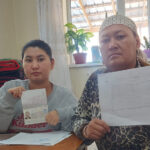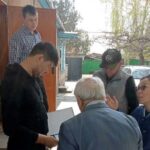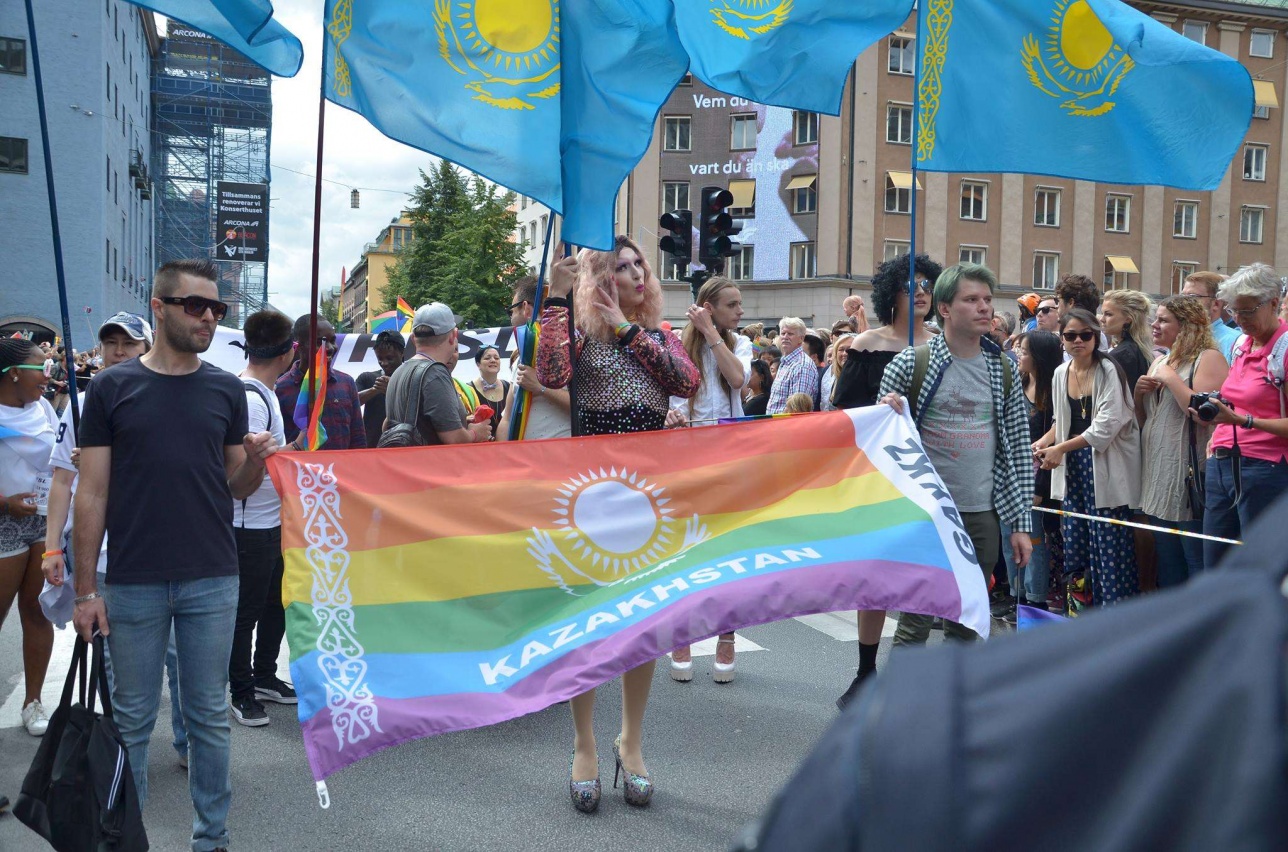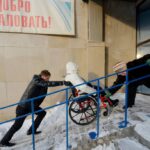Kenes Zhusupov, Kazakh lawyer for Uzbek Muslim prisoner of conscience Khayrullo Tursunov, has told Forum 18 News Service that “I am outraged –
The Kazakh lawyer for Uzbek Muslim prisoner of conscience Khayrullo Tursunov has condemned his government’s decision to extradite his client back to
“The Uzbeks wanted him back as part of their campaign against Muslims who read the Koran and pray”, Zhusupov commented. Tursunov “peacefully practiced his faith outside state-controlled Islam”, exiled Uzbek human rights defender Mutabar Tadjibayeva of the Fiery Hearts Club told Forum 18. Some relatives suspect that the authorities may have sought Tursunov in revenge for his wife’s escape from
Once he arrived in the Uzbek capital
Extradition – even after UN appeals for extradition to stop
The Kazakhstan International Bureau for Human Rights and the Rule of Law, in a 4 February appeal, noted that under the United Nations (UN) Convention against Torture and Other Cruel, Inhuman or Degrading Treatment or Punishment “the Kazakh authorities are obliged to desist from extraditing individuals to countries where torture is practised”. The Bureau notes that “
On 28 February, the UN Committee Against Torture – in a letter seen by Forum 18 – had called on the Kazakh authorities not to extradite him while his complaint to the Committee was being considered (see below).
On 13 March, after eleven months’ detention, Tursunov was put on a flight from Almaty to the Uzbek capital
The Almaty Office of the United Nations High Commissioner for Refugees (UNHCR) said it was unable to comment on Tursunov’s case, citing confidentiality. “However, even if a person is not of concern to UNHCR, the Agency always calls on countries to follow the provisions of international instruments,” it told Forum 18 from Almaty on 6 May.
Similar case
In a very similar case, the Committee against Torture is also investigating the fate of 29 Muslims illegally extradited by
Why?
Forum 18 was unable on 2 or 8 May to reach Iogan Merkel, a Deputy General Prosecutor of
Merkel’s Assistant referred Forum 18 to the International Relations Department of the General Prosecutor’s Office. But neither their phones nor those of Askhat Primbetov, head of the Extradition Division of the International Co-operation Department at the General Prosecutor’s Office, were answered on 2 or 8 May.
Asylum rejected, arrested after request from Uzbekistan
Tursunov – who is now 38 – fled
On 24 February 2012, Uzbek criminal charges were brought against Tursunov, and his arrest was ordered (see F18News 1 May 2013 http://www.forum18.org/Archive.php?article_id=1829).
After learning of the arrest order from
Tursunov was initially detained in Aktobe, but was transferred to a detention centre in Almaty in February 2013. While in prison in Aktobe, his lawyer Zhusupov visited Tursunov almost every week. “His morale was low,” Zhusupov told Forum 18. “He was very worried he would be unjustly sentenced and tortured if he was returned to
Illegal extradition?
On 27 April 2012,
On 9 November 2012 Zhusupov, Tursunov’s lawyer in
On 22 November 2012,
Among other conditions when a person must not be extradited, Judge Kustanova indicates in her decision that according to Article 532 of Kazakhstan’s Criminal Procedure Code, the authorities “must not extradite persons if there are grounds to suppose that the same persons may be subjected to torture in the requesting country.”
Torture in
However, without considering whether or not Tursunov might be subjected to torture in
Most of her decision simply recounts
Officials at Aktobe Court No. 2 told Forum 18 on 2 May that Judge Kustanova was on holiday and not available. Forum 18 was referred to Zhanat Alniyazova, Chair of the Court’s Chancellery. Asked why the Court upheld Tursunov’s extradition, Alniyazova repeated Judge Kustanova’s claim that the Court’s role was to “examine not whether or not Tursunov was guilty of the crimes but the legality of the extradition”.
Asked why the Court did not take into account the United Nations’ and other human rights organisations’ reports of torture in
She referred Forum 18 to Akbulat Kurmantayev, the Chair of the Court. On 2 May the phones of both Kurmantayev and his Assistant went unanswered. Kurmantayev’s phone was picked up a few times but put down without answering.
Appeal
On 3 January 2013, Tursunov appealed to Aktobe Regional Court, complaining that Deputy General Prosecutor Merkel and Judge Kustanova of Aktobe City Court No. 2 did not take into account inconsistencies in Uzbekistan’s charges (see F18News 1 May 2013 http://www.forum18.org/Archive.php?article_id=1829). He also maintained that if he was handed over to
On 18 January, a panel of judges at
The three-page 18 January decision, seen by Forum 18, repeats for the most part what is in Judge Kustanova’s decision. Judge Satybaldina in similar fashion as Judge Kustanova in her decision, without saying anything on whether or not Tursunov may be subjected to ill-treatment, claims that “the Court, on the basis of
Forum 18 was unable to reach Judge Satybaldina or any other official at the
“
As the Kazakhstan International Bureau for Human Rights and the Rule of Law pointed out, Tursunov’s return violated what Judge Satybaldina described as “Kazakhstan’s international obligations”. As Tursunov is likely to be tortured in
“1. No State Party shall expel, return (“refouler”) or extradite a person to another State where there are substantial grounds for believing that he would be in danger of being subjected to torture.
2. For the purpose of determining whether there are such grounds, the competent authorities shall take into account all relevant considerations including, where applicable, the existence in the State concerned of a consistent pattern of gross, flagrant or mass violations of human rights.”
Torture in
In a similar case to Tursunov’s, in June 2012 the Committee Against Torture found that Kazakhstan had violated the human rights of a group of Uzbek Muslims who were extradited to Uzbekistan in 2011 (see F18News 10 September 2012 http://www.forum18.org/Archive.php?article_id=1739 and below).
In stark contrast,
UN calls for extradition to be suspended
On 14 February, human rights defender Tadjibayeva lodged an individual complaint to the Committee Against Torture on behalf of Tursunov, as she noted on the Fiery Hearts Club website Jarayon.com.
The complaint was forwarded to the Kazakh government on 28 February, according to the United Nations Human Rights Treaties Division reply to Tadjibayeva the same day, seen by Forum 18.
“Please note that the [Committee against Torture’s] Special Rapporteur on New Complaints and Interim Measures has decided to request the State party [Kazakhstan] to refrain from extraditing Mr. Tursunov Khairullo Turdiyevich to Uzbekistan, while his complaint is under consideration by the Committee”, the 28 February UN letter states.
“Not the first case when Kazakh authorities violated their human rights obligations”
Human rights defender Tadjibayeva, head of the Fiery Hearts Club human rights organisation, based in
“This is not the first case when the Kazakh authorities violated their international human rights obligations and handed over refugees to
29 Muslim men’s extradition at UN
On 1 June 2012, the Committee Against Torture found that
An 8 November 2012 Kazakh government response – with information prepared by Kazakhstan’s General Prosecutor’s Office – claimed that between 3 and 14 August, Kazakh diplomats had interviewed 18 of those extradited back to Uzbekistan, all of them now in prison. “None of the visited convicts indicated to have been subjected to torture, unlawful measures of physical and moral pressure or other impermissible methods of investigation,” the UN summarised the Kazakh response as claiming (see F18News 5 December 2012 http://www.forum18.org/Archive.php?article_id=1777).
Laroque of Action des Chrétiens pour l’Abolition de la Torture (ACAT) told Forum 18 that the Kazakh government’s November 2012 response is being considered in private by the Committee Against Torture during its session in
“As the representative of the victims, I urge the Committee against Torture to be firm regarding Kazakhstan and request strong measures,” Laroque told Forum 18 from Paris on 7 May, “for instance to set up a mission with members of the CAT or independent experts to visit the complainants still detained and who are alleged to have been tortured in Uzbek jails.”
SOURCE:
Forum 18
www.forum18.org/Archive.php?article_id=1833
















